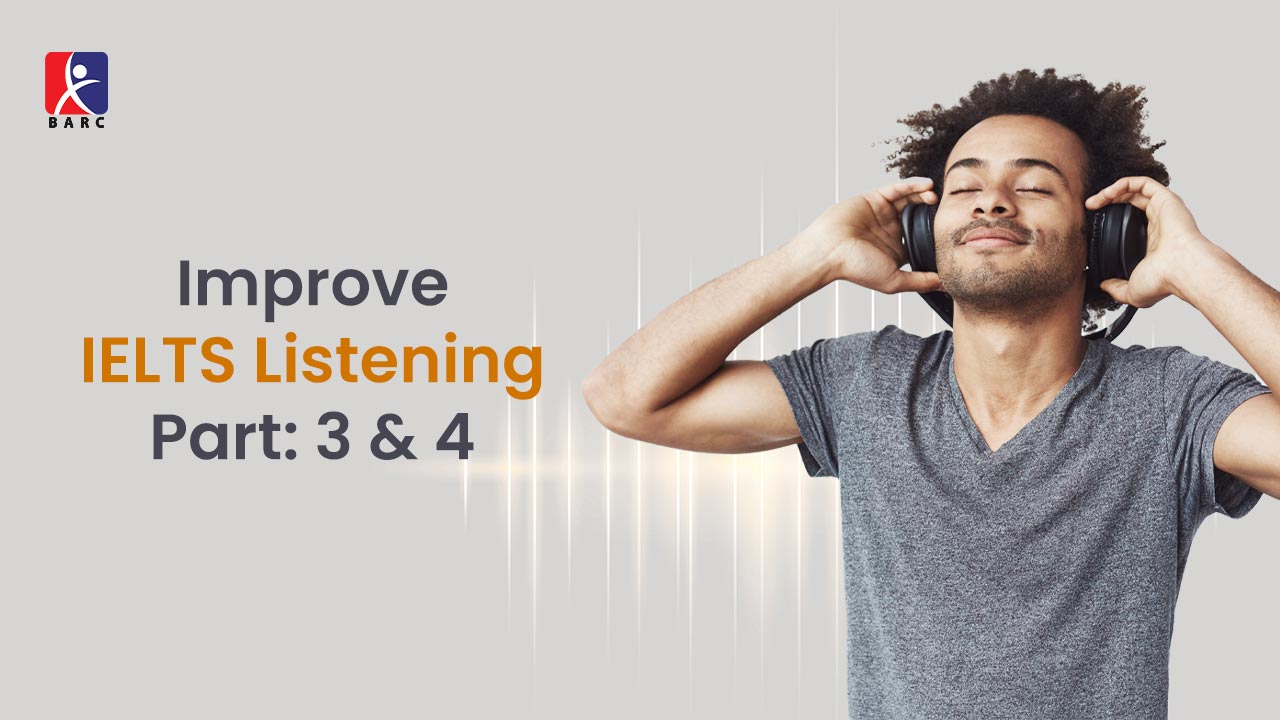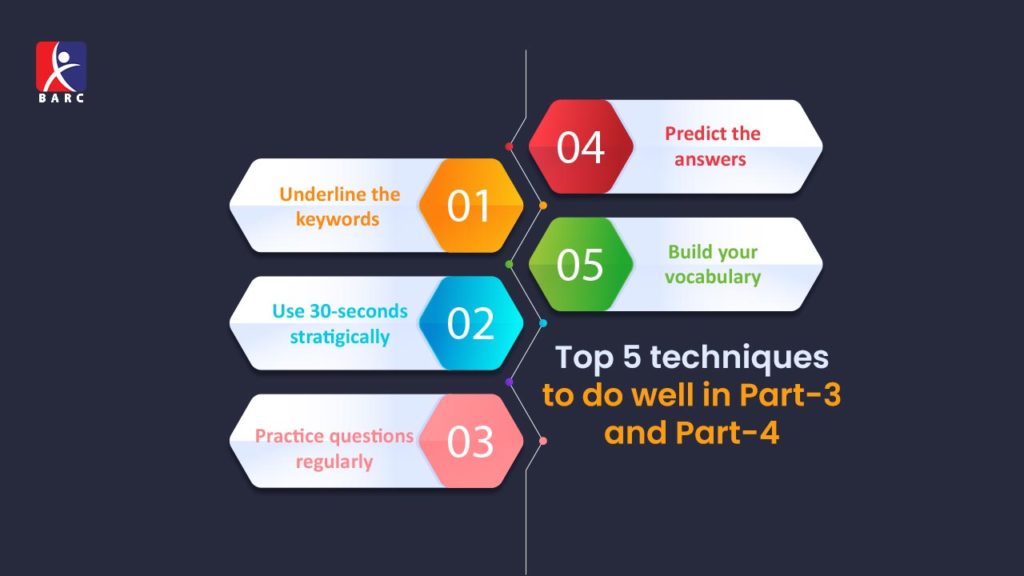
How to Improve IELTS Listening Part 3 and Part 4
You may know IELTS listening is of four different parts. Out of them, part 3 and 4 appear to be harder than the rest of the parts. The reason is obvious: Part-3 is an audio conversation of up to four people at a time and Part-4 tends to be of a lecture on a complicated topic. The major complication lies in recognizing the voices and conversations of various speakers in the conversation in Part-3; and Part-4 becomes arduous because it often includes topics from science or something difficult to comprehend. Nevertheless, here are strategies for you to make it easy and crack IELTS listening Part 3 & 4.
Top 5 Techniques to do well in IELTS Listening Part 3 & 4
In part 3, MCQs, matching headings, flow charts, or diagrams are commonly found. In the contrary, Part-4 will be an academic talk about certain topics such as biology, history environment, agriculture, etc.
1. Underline the keywords
This is important because it will enhance your possibility of finding answers faster. It’s often impossible to remember a bunch of information at a time. But when you highlight the key information in the questions while skimming the questions, it will help you incredibly at the time of listening to the audio to find answers way faster. Let’s look at how it can be done.
Question: Why is Jack interested in investigating seed germination?
Keywords: Why, Jack, interested, seed germination
Question: Why are changes needed to traffic systems in Granford?
Keywords: Why, changes, needed
Question: According to the speaker, one problem with the new regulations will be…
Keywords: One problem, new regulations
Question: In a survey, local residents particularly complained about
Keywrods: local residents, complained aboutNow, look at the examples and analyze how to extract the key information from the questions.
2. Use 30-seconds stratigically
Once you complete a particular part, you will be given 30 seconds to check your answers. You have to utilize this time to read through the questions of the following part.
In this way, when you’ll listen to the audio, you never have to look at the questions again; you’ll just look at the keywords and look for the answer. And you are very likely to find the answers easily in this way.
Sometimes, once you have utilized those 30 seconds time, you might get some extra time once the audio clip begins because it will again give you further time to read the questions, though it’s very limited. Then again look at the questions and set in your brain what you have to look for.
When you are completely sure, what is it that you are running after, you can catch up with the answers within a split second as soon as the audio releases them. In listening every second counts, and each of them is important. Just make the most out of it.

3. Practice questions regularly
Table completion, map, matching, MCQs, diagrams, and flowcharts are the most common types of questions in Part 3. Gap-fills and MCQs are, however, the most common question types in Part 4. While practicing from the past exam papers e.g., Cambridge IELTS books, analyze where your shortcomings lie especially question-type basis.
You have noticed, for example, you falter on maps, what would you do? Would you skip them and go on working more on your strengths? Umm, NO, you have to work on your weak zones, maps, in this case, so that you gain a strong command over this question type. As part of the primary initiative, maybe you can learn identifying directions and the languages used to express them. Say, the speaker says ‘West to the part’ but you are on the north side.
Then you might make mistakes. And you would also have to recognize directions through prepositional transitions like next to, opposite of, above, below, etc. If you work on recognizing directions, nobody will ever refrain you from doing well on maps. Likewise, once you figure out where your weaknesses are, you should work on individually that specific question type to maximize your listening score. Many of my students find this technique fruitful.
4. Predict the answers
Notwithstanding the fact that IELTS is a language test, listening has something to do with prediction skills. It largely boosts your potential of getting the right answers in the shortest possible time. You do not necessarily need to be 100% correct with your anticipation.
You will conspicuously have the correct answers if you practice building your anticipation power. And that’s easy. Let’s look at an example of how it works. Suppose you have seen a ‘$’ sign in the question, you should be assuming that the answer will be something like numbers.
It could be 30, 80, or even more. But that you have anticipated that the gap needs a number, you are already 50% ahead with your mindset to get the exact answer that you need. Again, if you find a question like ‘Clients who return get a …………………………. discount.’ In that case, you need be guessing that the gap would be best filled by a percentage in the gap.
Anticipation skills can also be built for the type of words that best fill the gaps. Let’s look at another example. If a question asks, ‘How to ……………………… and cook with seasonal products.’ Can you guess the type (noun, adjective, verb, etc.) that needs to be put here? As there is a word ‘to’ and there is a verb after ‘and’, you should be anticipating that a verb will be the most suitable filler here.
So this is how you build your anticipation power. No matter what you build a habit of predicting the answers using your anticipation power. You would experience a rapid improvement in your listening score. This is in a sense very easy but very valuable to grow in order to maximize your score.
5. Build your Vocabulary
IELTS is not a vocabulary game as I put it. Yet you need have a minimum level of vocabulary stock for dealing with the reading and listening section well. In listening, like reading, you will witness numerous answers being paraphrased throughout the talk.
The prospect of finding an answer with the same words in the questions appears bleak in the listening. So, it is best to build your lexical resources instead of daydreaming about finding answers with the same words as it is in the questions.
Well, I would say, you dedicate a certain amount of time to studying only vocabulary separately. Instead, make a habit of active reading and active listening. Read and listen regularly and the contents might not be IELTS-related.
While listening to podcasts or reading articles from newspapers or magazines, consciously notice what new words you find and what their figurative meaning of them under the given context. Thus, build your vocabulary through listening to conversations and reading articles rather than devoting time to memorizing vocabulary.
This is how you can improve your vocabulary. You can also make a notebook to keep track of the new words you have learned through practicing various IELTS passages and listening. But don’t forget to revise them at regular intervals.
In fact, the great scientist, Einstein also forgot the address of his own home. So, you always have to be careful to use and revise the vocabulary you have been learning. This is the most sustainable approach to learning vocabulary and recalling them for a long time.
In fine, the more you practice, the sharper you will be in listening. Of course, you have to follow the appropriate technique as you go ahead to secure your desired band score in IELTS. Trust me, there are no secret recipes to strengthen your skills other than practicing regularly. Regular practice is a catalyst to your ultimate success.
At the time of practice, following the strategies outlined above will facilitate your journey hopefully. I am waiting to know your success story. I know you can make it. Best wishes with your IELTS listening test. Let me know what score you have made in your exam.


Leave a Reply